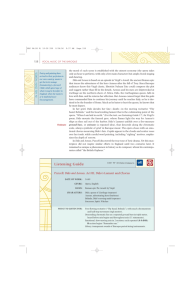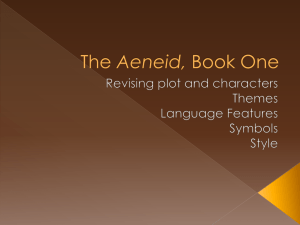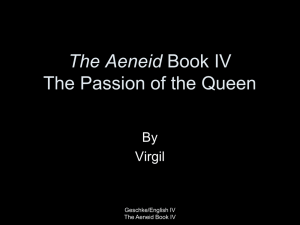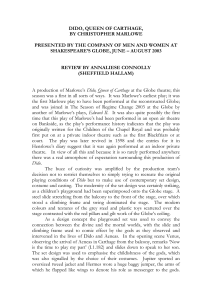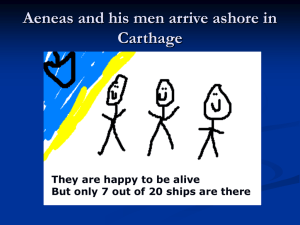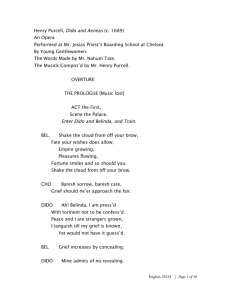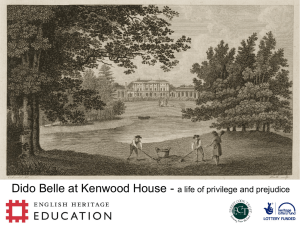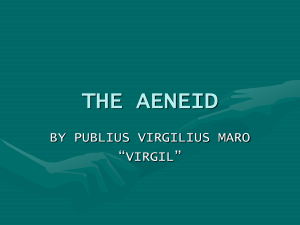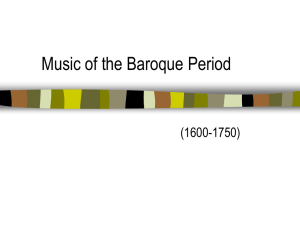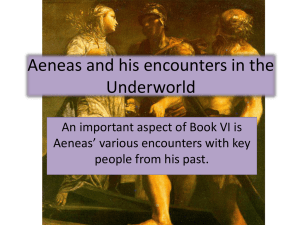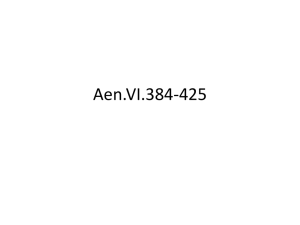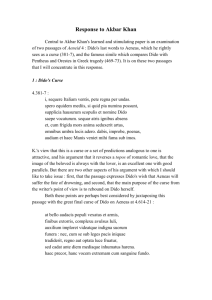Book IV - without pictures
advertisement
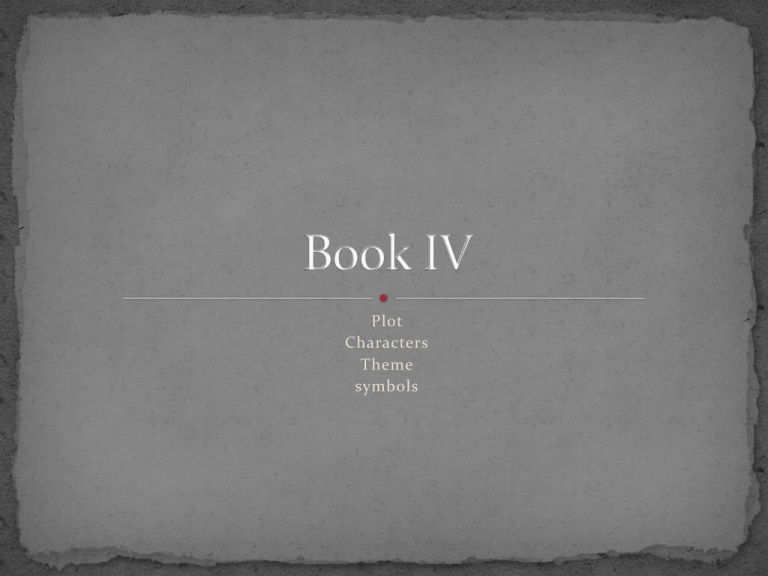
Plot Characters Theme symbols In order to gain a greater understanding of the Aeneid we need to look at the plot, characters, themes and symbols within Book IV. Why had Dido sworn never to marry again? Anna, Dido’s sister, gives two reasons, one personal and one political why Dido should marry again. What are these reasons? Who is the goddess of marriage to whom Dido sacrifices? What other special concerns does this goddess have throughout the Aeneid? What effect did Dido’s lovesickness have on life in Carthage? 1) Juno observes this and she offers a kind of treaty to Venus 3) She is wild with love and she staggers through the city like a doe hit by an arrow. The city ceases to be built. Plot in Bk IV 2)Anna tells her that Sychaeus would not mind if she took a new and powerful husband. She explains that with so many hostile tribes around them, a joint city with the Trojans would be desirable. 4)Dido is overcome by love for Aeneas. 5)She admits to her sister, Anna, that he is the only man she has loved since Sychaeus Finish off the activity sheet in pairs. Questions for the question exercise: Who is Rumour and what does she do? Why does Dido not believe Aeneas? Who does Dido claim bore Aeneas? Give a rational reason as to why Dido is so irrational? Read pages 23 – 25 and activities 1, 4, 9 and 11 from the Findlay text. Dido foretells the hatred between Carthage and Rome. Vergil incorporates Roman history partially trying to justify the history of war between the two nations. What disadvantage had Dido incurred by giving her love to Aeneas? What reasons does Aeneas offer for his inability to stay with Dido? Dido: she can no longer rule her city because she is overcome with love. When she and Aeneas make love, she thinks that this is marriage, but he does not. Her love for him and her reaction to rejection changes her from a noble queen into an irrational being. Dido confides to her sister that she feels: confused, upset. But why…? Dido had sworn never to love or marry another man after the death of her first husband - Sychaeus. “Relics once dear, while fate and heaven allowed, take this my spirit and loose me from these woes. My life is lived; the course by fortune given I have fulfilled, and now the shade of me passes majestic to the world below. I have built a noble city, mine own walls beheld, avenged my husband….” (lines 651-653) Dido recovers her dignity The gods take pity on her, Juno allows her to go into the after life. What is Aeneas’ personal attitude to Dido’s anger and grief? He is reminded (by Jupiter via Mercury that he has a higher purpose. He feels that he must put personal issues aside and continue his divine mission. IMPORTANT MORAL VALUE He reminds her: that they aren’t married, That his first obligation is to duty and destiny. He remains somewhat unemotional throughout and further pleading by Dido doesn’t work Create a mind map demonstrating how Aeneas acts, his relationship with Dido, pietas and his emotions. Book IV underlines Aeneas’ human weakness and his forgetfulness of his mission. He is not yet completely willing to follow his destiny. Yet his decision to leave demonstrates that he is moving towards this goal. Briefly jot down the names of the minor characters introduced in Book IV and their roles. Re-write your chosen scene in modern language. Either re-enact the scene or create an interview scenario whereby one character is interviewed by a reporter. Suggested scenes: Juno and Venus plotting, Mercury and Aeneas discussing the latter’s destiny, Aeneas give Dido the cold shoulder, Dido’s anger, exclaiming that Venus is not Aeneas’ mother, Dido talking to Anna (tricking Anna to help make her funeral pyre), Dido’s soliloquy. Juno and Venus decide that a union between Aeneas and Dido would be a good thing. Jupiter sends Mercury down to Aeneas to tell him to leave for Italy reminding him of his destiny in Italy. Aeneas immediately starts making preparations to leave. Juno takes pity on the poor woman and sends Iris to release her soul and lead it into the afterlife. Who played the role of Maximus in the 2000 film Gladiator? Russell Crowe Divine intervention • • • • • • Role of the gods: Juno and Venus, Jupiter, Mercury, Iris. The gods meddle in order to get their own way with no thought to the cost of human pain and suffering. Aeneas’ divine The relationship quest between people and His temporary fate stay at Carthage •Between Dido and develops into a fate lengthy love affair. •Aeneas and fate Moral issue: The meaning of life personal life VS • Dido commits suicide his mission. because of her shame, How it effects loss of self respect and other individuals. dignity. The images of wounds and fire demonstrate Dido’s destructive. “when cold death has severed soul and limb, in every place my shade shall haunt thee.” (line 386) “bankrupt at heart she rages, and on fire through all the city, like some Maenad….” (line 302) The main image in the text is the hunt. The doe symbolically represents Dido and the oak tree is Aeneas. Exercise: find quotes from the text. Rumour and Dawn are personified elements. “As many tongues, as many sounding mouths, pricks ears as many: by night ‘twixt earth and heaven she cleaves the darkness, hissing as she flies” (line 184)- Rumour Disease used to describe Dido and Aeneas’ illfated relationship. “First day of death was that, first cause of ill” (line 171) Dido and Aeneas have just made love. It suggests that it is the turning point in their relationship
